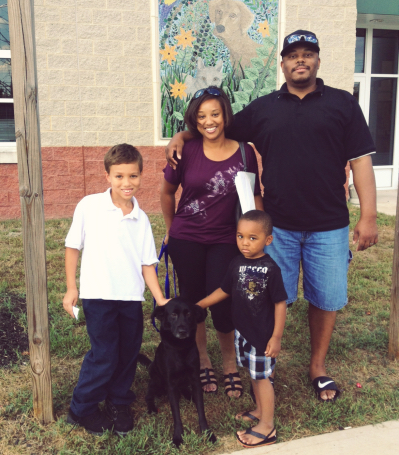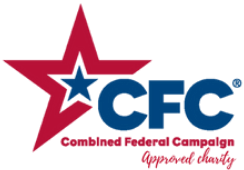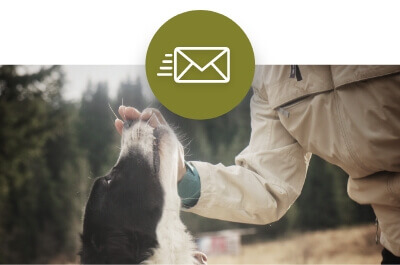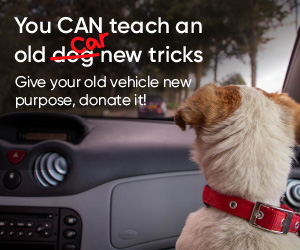Star came from a military family and felt called to serve. But when the Iraq war veteran found herself gripped with Post Traumatic Stress Disorder (PTSD) and other trauma, it was an adopted companion dog – aptly named Lucky – who helped her cope with the wounds of war.
“I never got back to being myself”
Star grew up as a military brat.
“My entire family is military. It’s all I’ve known my entire life,” she explains.
Enlisting in the Army right after high school and ROTC seem like the right choice. Yet Star found the experience to be overwhelming and was discharged just a few months later.
“It was maybe too soon. It was too much for me to handle,” she says. “I couldn’t deal with it.”
Many different jobs followed. Star was a teacher, bank teller, waitress, and bartender, but did not find satisfaction in any of those roles. In spite of her earlier experience, the desire to serve in the armed forces was unrelenting.
About five years later, Star fulfilled her dreams. She re-enlisted, completed basic training at Fort Jackson and was sent to her first duty station at Fort Drum in New York. 
Although Star was originally trained as a financial management specialist, she decided to change her Military Occupation Specialty (MOS); she wanted to be a combat medic. She was deployed to Iraq after receiving her training at both Fort Sam Houston in San Antonio, Texas and Fort Irwin in California.
“It was my first deployment,” she recalls. “I was scared. I didn’t know what to do.”
Still, the Army veteran considers herself fortunate.
“I went on lots of missions that required convoys,” Star says. “We were only hit three times with IEDs [Improvised Explosive Devices], which was pretty good. We were pretty lucky.”
However, Star did not leave the war zone unscathed.
“Some instances happened that caused me to go into a shell. I wasn’t able to come back from what was happening,” she says.
The combat medic sought out available assistance, but did not find it to be very helpful.
“I had to talk to a therapist in Iraq. The therapist was part of my unit, and it was supposed to be confidential, but it was not,” she says. “Everyone wound up knowing my business and what was going on.”
Things got progressively worse from there, but Star knew she had to keep herself together for the remainder of her deployment. She never felt completely normal and even though she knew something was wrong, she did not believe anything could help her.
There came a time, however, when Star knew she could no longer avoid seeking help.
After transferring to Hawaii for a few years, and then to Fort Benning, Georgia, Star was diagnosed with bipolar disorder. In addition she suffered with severe anxiety – a symptom of her Post Traumatic Stress Disorder – and back pain from an injury she incurred during deployment that never healed correctly.
“I didn’t want to get out, but because I had so many issues,” she says, “[but] I didn’t have a choice. They said, ‘It’s not benefiting you or the Army for you to stay in.’”
In 2013 after serving for nearly 10 years, Star was medically retired from the Army.
People and pets deserve a second chance
Star longed for any respite from her anxiety and claustrophobia, and eventually decided that a companion pet might help her.
“I wanted to feel comfortable at home when I am by myself,” she says.
Star was researching various programs online when she discovered Pets for Patriots, a nationally operating charity that helps veterans adopt companion dogs and cats. She read the testimonials and stories of veterans who had adopted through the program, and liked how Pets for Patriots did not push itself on people.
“[They are] not concerned with getting their name out there [or] popularity,” she says, which for her made the organization “the obvious choice.”
Like many veterans who adopt their pets through Pets for Patriots, Star was determined to find a shelter pet, not an animal from a backyard breeder or puppy mill. It upsets her that many people have negative associations with shelter animals despite the fact that pets find themselves homeless through no fault of their own.
“I look at them just like us,” she says. “They’ve gone through stuff like us; they should be given a chance just like us.”
In many ways Stars’ healing began when she gave a second chance to a then four year-old black Lab mix in the care of Prince George’s County Animal Management Division. The municipal shelter partners with Pets for Patriots to help veterans adopt the most overlooked companion animals, and waives pet adoption fees for veterans approved into the program.
“Lucky was in a corner cage,” Star remembers. “He came up and sat. He immediately put his paw out. He came out of the cage and sat with us. It just clicked. It was instantaneous; I didn’t have to think.”
The very next day, Star and her family brought Lucky home.
No place like home
Lucky took his place as a member of the family easily.
“He just fit in,” says Star. “He was not scared to come to us or interact. He said, ‘Hey, I’m here. I’m yours. Come get me.’”
The big dog’s mellow demeanor led Star to believe that he could handle her issues as well as a house full of kids.
“There was no question in my mind that he was the dog we needed,” Star says with confidence. “And he was really cute, too.”
Now when Star feels depressed, Lucky lays under her feet until she feels better and can get up.
“He keeps me calm,” she says. “He keeps me from feeling anxious. If I call, he’s right there. He meets me at the door when I go out. When I feel like there’s no hope, he helps me to feel better, not down.”
Although Lucky is helping Star overcome her war wounds, she recognizes that healing takes time. As she begins to see the positive changes in her life and those of her children, she’s feeling more and more at peace.
“Slowly but surely I am becoming more comfortable, less threatened by the outside environment,” she shares, “but it is still a work in progress. I am more comfortable when in the house, not anxious and scared when alone. When he’s with me I don’t feel like there’s a threat.”
Lucky’s calming presence is not felt by Star alone, but by the whole household. He can tell when one of the children is upset, and will approach them, nudging with his nose.
“He’s been positive for us,” says the Army veteran.
Hope and gratitude
Star describes her experience with Pets for Patriots as nothing short of “awesome.” Pets for Patriots was quick to answer emails and return phone calls, and provided her with a lot of information – especially during a brief period when she was less convinced that Lucky was the perfect fit.
“I would definitely recommend them,” she says. “They are very professional. [They] care about pets and you, too.”
The Army veteran believes that Lucky and Pets for Patriots helped her regain her family life, her social life and even her sanity.
“I don’t know where I would be or what I would be doing without them,” Star says. “I will always remember what they did for me. I can’t thank them enough.”
Above all, adopting Lucky has given Star something that has eluded her for far too long: hope.
“I have a friend to feel safe with,” she says, “[but] the biggest thing of all – I have my hope back.”
Are you or do you know a veteran who would benefit from a companion pet? Learn more about our program here.











Sorry, Scotty…we should have started with “Kleenex alert!” Thank you for your service and kind words.
Hi Beth What a wonderful story( Needs a hanky warning). Thanks for all your great efforts. Pets really make a difference!!!! Scotty